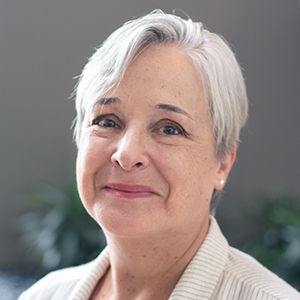
It’s all about making connections
The American Society for Biochemistry and Molecular Biology’s Graduate Student Diversity, Equity and Inclusion Award provides up to $1,000 for travel expenses to attend the society’s annual meeting. But it’s more than that.
“I would really say that getting the award helped me to embrace science and research, because it opened my eyes to the endless, endless possibilities of research,” Samuel Okpechi said.
Chioma Aloh said the award was “a continuous reward for me.”
The award is about making connections at the meeting as much as it is a financial boost to get there. Students from historically underrepresented backgrounds often find it challenging to network with more senior scientists and researchers. That’s part of what this award addresses. This year’s 24 recipients had multiple opportunities to spend time with scientists at all career stages — and sitting on the sidelines was not an option.
Breakfast with bingo
In Philadelphia in April, the connections began with a lively breakfast that included a special get-to-know-you game of bingo, where attendees had to find out about each other by checking off boxes about family, pets, hobbies and other nonscience interests.
“Bingo was a neat way to just get total chaos in the room,” Cameron Lee–Lopez said. “Everybody was running around asking, ‘Do you play an instrument? Do you do this? Do you do that?’ And as soon as you hit off one of their checkboxes, everybody would swarm over to you, and you’d be suddenly taking part in 10 conversations at once.”
Those conversations led to exchanges of more information — and business cards. Aloh said one card was particularly memorable. “I met a postdoc who had a card (that) had her face on it.”
The postdoc invited Aloh to attend her presentation on liposomes. Because, of course, all conversations at the annual meeting eventually turn to science.
Sam Okpechi ran into a team that runs the proteomics core at their institution. “I was trying to explain to them what I do,” he said, “and they quickly told me that’s similar to what they do … So it was easy for us to communicate. Our research questions are different, but the tool is the same.”
As a result of the breakfast, Alhaji Janneh opened a Twitter account. Before, he said, “I didn’t know Twitter was something very important in the scientific community.”
Good science and good food
In addition to displaying their posters in the big exhibition hall, DEI award recipients get to share their science in a more intimate setting — the Maximizing Access (formerly Minority Affairs) Committee’s evening reception. While guests balanced plates of donuts and sliders, the 24 posters drew intense interest.
“I forgot to eat,” Janneh said. He had expected one or two people but drew a nonstop crowd. “And then I was talking, talking throughout the whole night.”
Most people were interested in hearing about Janneh’s research, but a few invited him to contact them about joining their labs or coming to their universities as a postdoc.
Lindsey Backman especially enjoyed her interactions with undergraduates.
“I felt like half of my time was spent just talking about the summer research programs I did as an undergrad that got me into grad school,” she said. “And that part was really fun.”
Backman said she’s stayed in touch with a number of students interested in the Massachusetts Institute of Technology’s summer research program, which, like the DEI award, is geared toward students from underrepresented backgrounds.
Aloh also enjoyed interacting with younger students. “They were doing research quite similar to mine, and they wanted to know what next steps to take,” she said. “It was kind of fun, when after all your work, somebody looked at you, and you’re the expert.”
But Aloh didn’t spend time with just undergrads. She explained her poster to one visitor only to learn later that it was outgoing ASBMB President Toni Antalis.
“She was talking to me about my research,” Aloh said. “She asked if I wanted to do a postdoc. Then I asked her about her own research.”
Lee–Lopez also had a memorable conversation with a principal investigator, one who shared some common ground: “He’s looking in mammalian systems, whereas I look at bacterial, but he works with a protein that’s very similar to mine and the way it behaves with redox chemistry. So we have that connection there.”
DETAILS
Interested in applying for the ASBMB’s DEI travel award? It’s easy to do when you submit your abstract. Don’t forget — the deadline for abstracts and travel awards is Nov. 30!Okpechi found the reception more intimate than the general poster session. “It was more of a family coming together,” he said. “The atmosphere was fun — was lively. Also, the food was great.”
But more important to him was talking about science.
“I communicated what I do on a daily basis and communicated what keeps me up at night,” he said, adding that he focused on three topics: exchanging information about research to see if he and whoever he was talking to had common ground, then finding out how they felt about their institutions and labs, and finally discussing the future of research “and what would be the hot jobs of the future.”
Backman also wove careers into her conversation with former MAC chairman Squire Booker of Pennsylvania State University, who works in her field. In March, Backman was months from starting an independent lab, and Booker wanted to hear her ideas. The two talked even after the reception ended, and Booker introduced Backman to other faculty members.
She was also happy to mingle with scientists at a variety of career stages, from undergrads to PIs. “There wasn’t a weird separation of all of the professors in one area,” she said. “It felt like a more inclusive environment, the way it was laid out. … I felt comfortable. And I felt included.”
A different kind of mentor
One benefit of the DEI award lasts for a year — and sometimes longer. Each recipient is paired, based on career goals, with a senior scientist. The pairs meet at the conference and at least once a quarter in the year after the meeting, but this is just the bare minimum and many mentors exceed it.
Janneh said Kayunta Johnson–Winters, an associate professor at the University of Texas at Arlington, “gave really honest advice,” which included, “You have to be able to know how to approach your PI and committee members. You can’t just get up and go to your PI and say, ‘I want to graduate.’ You have to get your stuff together and know what to say. It’s about communication, self-awareness and accountability.”
Lee–Lopez found that he and Juan Mendoza, an assistant professor at the University of Chicago, had a lot in common. “He grew up in a Hispanic community like I did, and so we were able to connect on the attitudes that people had in those communities,” Lee–Lopez said. “We started talking about the advisers that we worked for. And we noticed that a lot of these guys have very similar attitudes … toward research, toward us, how they handle things in their labs.”
Lee–Lopez appreciated his mentor’s perspective on his work. “Up to this point, I’ve had a set of methods that I’ve been working with,” he said. “You get in your rut — what works, what doesn’t. But when I was talking to him, he started incorporating different methodologies.”
Mendoza also addressed Lee–Lopez’s imposter syndrome. “It was reassuring to hear him say, ‘Your research is super important.’”
Okpechi’s mentor, Bede Portz, an associate principal scientist at Dewpoint Therapeutics, was unable to attend the meeting, but that didn’t stop him from making contact and doling out advice. The two have monthly Zoom meetings to discuss science and Okpechi’s career.
“We speak a similar language,” Okpechi said. “I never understood the magnitude of what I’m doing, and how it can translate to what has been done in the industry. But he opened my eyes.”
Backman said she didn’t realize when she applied that the award had such a significant mentoring component. She and Carlos Castañeda, an associate professor at Syracuse University, bonded both on a professional and on a personal level. They talked about disordered proteins, starting a lab and being a Latino scientist.
“He’s really focused on mentoring other people, and I’m really focused on mentoring future generations, so we had a lot in common on that level,” she said.
Authoritative advice
Lee–Lopez is still deciding whether to go into academia, industry or government, and he appreciated Mendoza’s input. “It was really nice to get his perspective on academia and realize that with everything that you hear about it — underpaid, overworked — that there are people who have things that are really good to say about it. You’re able to go in and be your own boss.”
Aloh, who aspires to a career in industry, got valuable advice about teamwork from Nihmat Morjana, a director at Siemens Healthcare Diagnostics, who encouraged her to do a postdoc in industry to experience a culture that highlights teamwork rather than the individual projects she has worked on in academia.
“He said, as a scientist working in industry, you have to be able to bridge the gap between people that have different degrees and different functions and skills in the company,” she said. “You have to be able to communicate with everybody in your group.”
Portz gave Okpechi advice on what do to before he starts to apply for positions. “First and foremost is to make sure that I published my thesis research … because industry recruiters want to know that I can start and finish a project,” Okpechi said. “And he told me to cultivate the habit of beginning tasks early — because if I start early, I would escape those procrastination pitfalls.”
Okpechi said Portz also advised him to keep a “flexible and open mindset” when it comes to career opportunities both in and out of industry.
A ticket into the arena
A big scientific conference can be intimidating and bewildering for younger scientists. The experiences provided by the DEI award program help mitigate these feelings.
Janneh said he enjoyed the meeting more than any other he’s attended. “It felt like a family,” he said. “It just had a different vibe, like you can easily talk to people and people are really willing to talk to you. Like, you don’t have to work as hard.”
Seeing unfamiliar technologies at the meeting, Lee–Lopez began thinking about a whole new career path — starting a company in Europe with a friend who now lives in Germany. “It got the wheels turning for what we want to do later on,” he said.
Having just accepted a new position, Backman said the timing of the meeting was perfect for her. She was able to talk to professors in a variety of disciplines about her research and get advice about starting a lab, “like establishing a research program, making sure your lab has a good healthy culture and prioritizing our values.”
Okpechi summed up his feelings this way: “It’s like a pass or a ticket that helps people to get into the arena where they can be reminded of the possibilities of science and research. And it’s very important that young scientists like ourselves, mostly minorities, are provided with this opportunity to be among researchers, to be among scientists, to be amongst innovators.”
Meet the five travel award recipients we talked to
Chioma Helen Aloh is a fourth-year Ph.D. candidate in Holly Ellis’ lab at East Carolina University. She’s originally from Nigeria and earned her bachelor’s in applied biochemistry at Nnamdi Azikiwe University.
“My work is focused on evaluating two-component, flavin-dependent enzyme systems that are involved in the acquisition of sulfur when it is scarce in the environment. Sulfur plays a key role in various processes, making these systems pertinent for the survival of bacteria. These complex enzyme systems utilize several strategic mechanisms such as oligomeric changes, protein–protein interactions and distinct secondary structure to catalyze the desulfonation mechanism. The virulence of pathogenic bacteria is directly linked to adequate sulfur levels, so understanding the structural and functional properties of these enzymes would promote the development of targeted inhibitors.”
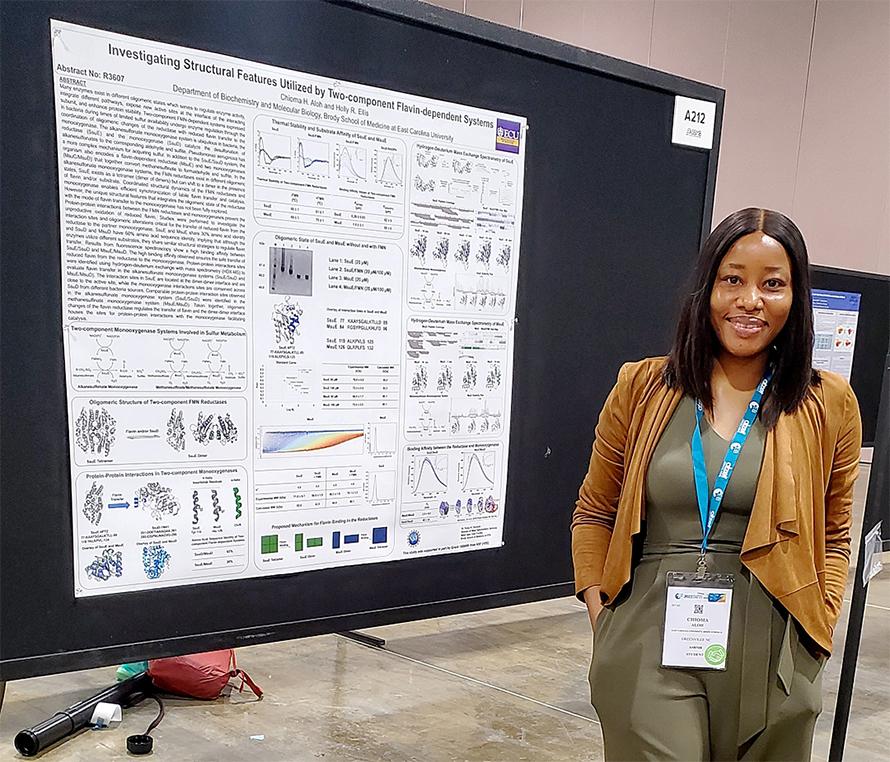
Lindsey Backman in September became a fellow at the Whitehead Institute for Biomedical Research. She earned her Ph.D. in chemistry in Cathy Drennan’s lab at the Massachusetts Institute of Technology. Originally from Tampa, she earned her undergraduate degree in chemistry at the University of Florida.
“I am interested in understanding the strategies that offer some bacterial species a competitive advantage in the human microbiome, such as consuming niche nutrients that other bacteria cannot metabolize or possessing unique, protective abilities that enable survival in extreme environments. I employ biochemical and structural biology techniques to study pathways that provide such competitive advantages. With the global increase of antibiotic-resistant pathogens, there is a critical need for developing new antibiotics. ”
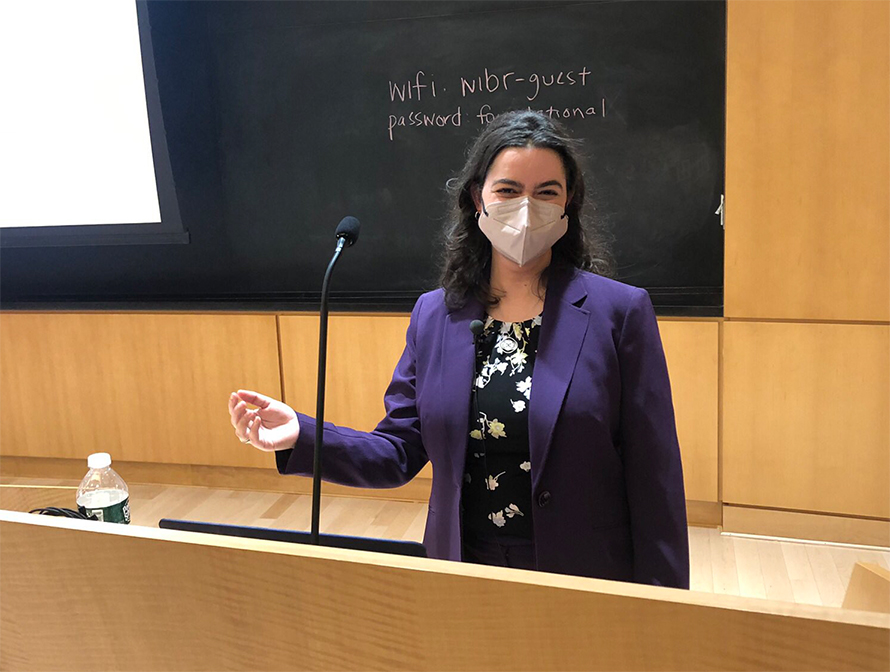
Alhaji Janneh is a Ph.D. candidate working in Besim Ogretmen’s lab at the Medical University of South Carolina. He’s originally from Sierra Leone and earned his bachelor’s in biology from Hampton University in Virginia.
“My research focuses on the mechanisms involved in the crosstalk between sphingolipid metabolism and the complement system in regulating tumor metastasis. I am trying to understand how specific lipids in our body communicate with the complement system, an integral part of our immune system, to promote cancer metastasis. The ultimate goal is to discover a novel therapeutic strategy that prevents cancer cells from spreading.”
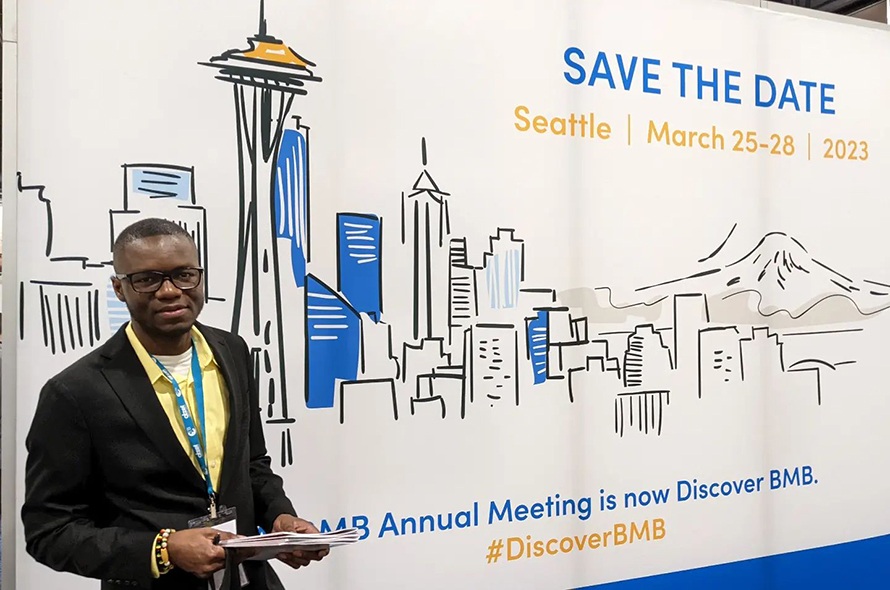
Cameron Lee–Lopez is a graduate research assistant in Erik Yukl’s lab at New Mexico State University. Originally from El Paso, Texas, he earned his bachelor’s in biochemistry at Texas Tech University.
“I research the regulation of bacterial biofilm formation/dispersal through families of nitric oxide– and redox–sensing proteins. Biofilms are a serious public health concern because they provide protection from several external factors, including antibiotics. By understanding what mechanisms control these biofilm-related behaviors, we can potentially work to prevent their formation in health care and industrial settings.”
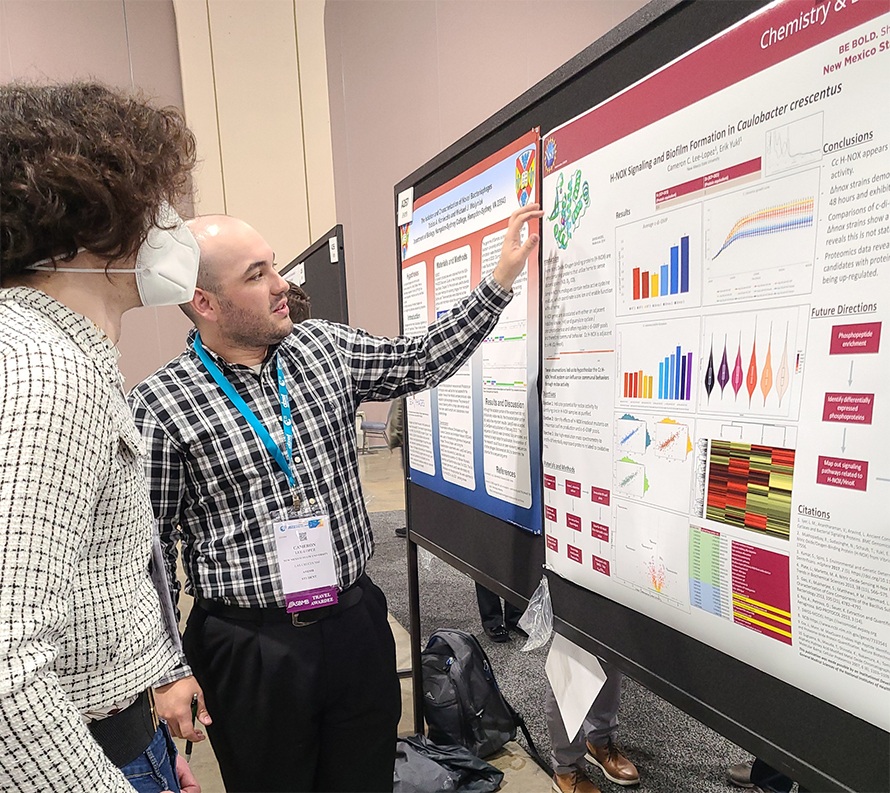
Samuel Chukwudi Okpechi is in his final year as a Ph.D. candidate in Suresh Alahari’s lab at the Louisiana State University School of Medicine and Health Sciences Center in New Orleans. Originally from Nigeria, he earned his undergraduate degree in biological sciences at Southern University at New Orleans.
“Triple negative breast cancer, or TNBC, is a clinical subtype of breast cancer that is more proliferative and highly metastatic. Patients harbor cells that lack critical receptors that can be utilized in the delivery of drugs across cellular surfaces. My project is specifically to screen by examining the efficacies and potential mechanism of action of different small-molecule therapeutic compounds in reducing the viability and proliferation of TNBC cells. Overall, the aim is to provide more chemotherapeutic options, with low toxicity and high efficacy.”
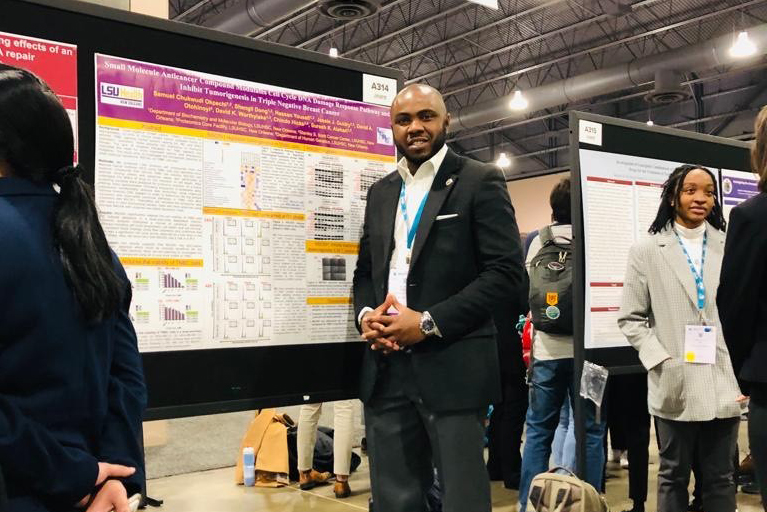
Enjoy reading ASBMB Today?
Become a member to receive the print edition four times a year and the digital edition monthly.
Learn moreFeatured jobs
from the ASBMB career center
Get the latest from ASBMB Today
Enter your email address, and we’ll send you a weekly email with recent articles, interviews and more.
Latest in Careers
Careers highlights or most popular articles

From humble beginnings to unlocking lysosomal secrets
Monther Abu–Remaileh will receive the ASBMB’s 2026 Walter A. Shaw Young Investigator Award in Lipid Research at the ASBMB Annual Meeting, March 7-10 in Washington, D.C.

Chemistry meets biology to thwart parasites
Margaret Phillips will receive the Alice and C. C. Wang Award in Molecular Parasitology at the ASBMB Annual Meeting, March 7-10 in Washington, D.C.

Decoding how bacteria flip host’s molecular switches
Kim Orth will receive the Earl and Thressa Stadtman Distinguished Scientists Award at the ASBMB Annual Meeting, March 7–10, just outside of Washington, D.C.

Defining JNKs: Targets for drug discovery
Roger Davis will receive the Bert and Natalie Vallee Award in Biomedical Science at the ASBMB Annual Meeting, March 7–10, just outside of Washington, D.C.

Upcoming opportunities
No matter where you are in your career and what future path you aspire to, everyone needs leadership skills. Join ASBMB for practical strategies for building and practicing leadership skills.

Close out ASBMB 2026 with a bang
The closing reception of the 2026 ASBMB Annual Meeting will be held at the Torpedo Factory Art Center in Alexandra, Virginia.

